Conversations with Monsters – an author Q&A with Charlotte Amelia Poe
Written by best-selling author Charlotte Amelia Poe, Conversations with Monsters is a poignant and whimsical exploration of the true autistic experience. Chapter-by-chapter, Poe delicately peels back the layers of what it is to be young and autistic in the modern world, touching on trauma, grief, mortality, love and everything in between. We sat down with Poe for a chat about their writing process and bringing this ‘haunted book’ to life!
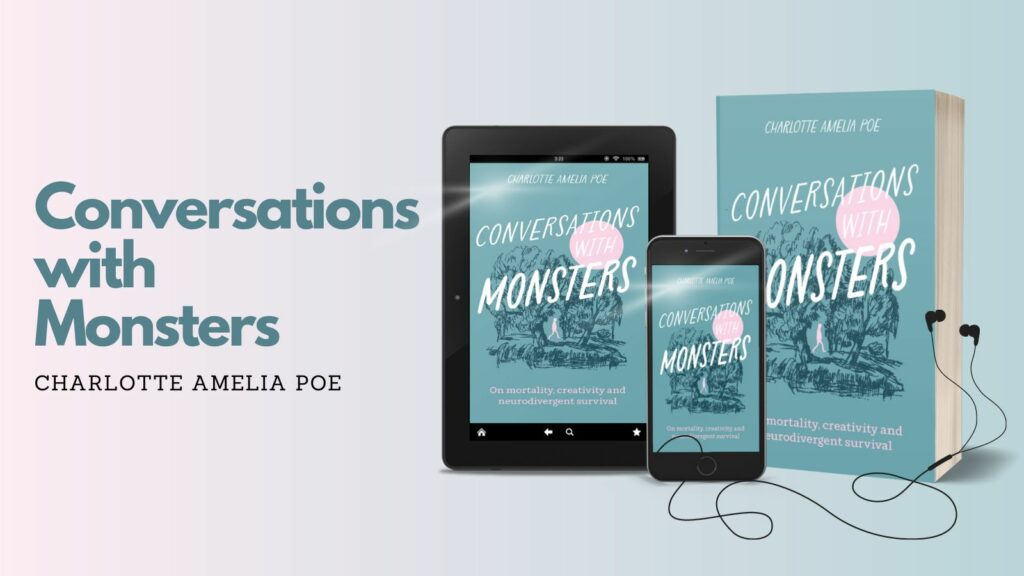
Hi Poe, congratulations on the upcoming new book, Conversations with Monsters! Can you tell us a little bit about how it came about and the inspiration behind it?
Whilst I was never close to my grandparents, when they both died within months of each other (my grandmother on my birthday) it definitely felt like I was moving forward in the… queue of mortality, like, it was this very ominous feeling, and having never experienced death outside of losing my cat, Amber, which still makes me cry in a very visceral way, it was really weird to consider that this could all be temporary, and what on earth are we supposed to do with that knowledge? It felt really important to explore that and to try to find the place art has in that question – can art save us? Can you “cheat death” by creating art? Is that a valid reason to create art? I think, and I definitely want to explore this further in the future, but I think art is this universal but also deeply personal thing that we use to try to reach out to others to try to figure out if other people are feeling how we’re feeling, and to sort of validate our feelings, whether that is or isn’t grieving, or whether it’s that existential fear that comes with confronting death for the first time. I think definitely I wanted to be like HELP I FEEL SCARED and I was hoping to reach across time and space and the void to let people know that like… that’s normal, and while I don’t have any answers as such, it’s not a unique feeling, however isolating it does sometimes feel. Like, we don’t talk about this, and I think possibly as a neurodivergent person I do focus on it more, as with so many things, and a lot of stuff I was reading was through a very neurotypical lens, so yeah, I felt like, even if it was just me hyperventilating in a corner, it might have some value to someone else in another corner somewhere, haha.
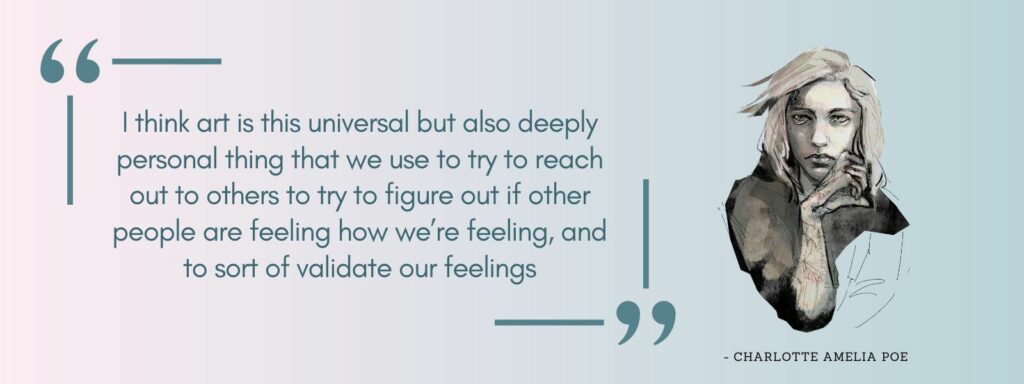
How does this book compare or contrast with your previous book and your Spectrum Art Award prize-winning video of the same name: How to Be Autistic?
Conversations with Monsters is definitely so much more deliberate than How to Be Autistic was. I think it is a lot closer to the video of HTBA than the book, this is more precise, more laser guided in a way, whilst also using a lot of metaphor because I don’t think you can describe a lot of these feelings directly, I think mortality, death, etc, it escapes language a lot of the time, so I wanted to create an environment, a setting, which was kind of abstract and didn’t pin someone down to just one solution or answer. I wanted it to be more of an exploration than a definitive thesis statement. I think sometimes people will say “no, this is definitely the answer you’re looking for” and I think that can be very dangerous, anyone who offers easy solutions to the most difficult questions should be examined carefully. So I think whilst I say, like, hey, for me, art can be the thing I need to survive this, I don’t prescribe it to everyone, because 1) not everyone is seeking immortality, and 2) there are different ways to achieve it – through family or the passing down of knowledge, or societal change. Everything has a butterfly effect and I think if it is something that scares you, then this book is saying “here’s what works for me” but it isn’t the be all and end all. Also I definitely regret being so literal in HTBA – naming people, keeping everything so narratively simple as though the curtain would drop and I would be like “oh, I’m okay now” which I think a lot of people expect – when I’m still just as autistic as I was before, and materially my life hasn’t changed all that much. So I think this book is more honest and more true, I didn’t want to present a better version of myself than what exists. Also, like, I’m a better writer, hopefully, than I was five years ago! And even since writing this book, I’m a better writer now, even! I’m glad I got to experiment with language so much with this book, it was so fun, and I hope I get to do it more in the future. I think you can say stuff through poetry that you can’t admit to in plain language, and I think that’s really interesting and can be really helpful – I definitely recommend it.
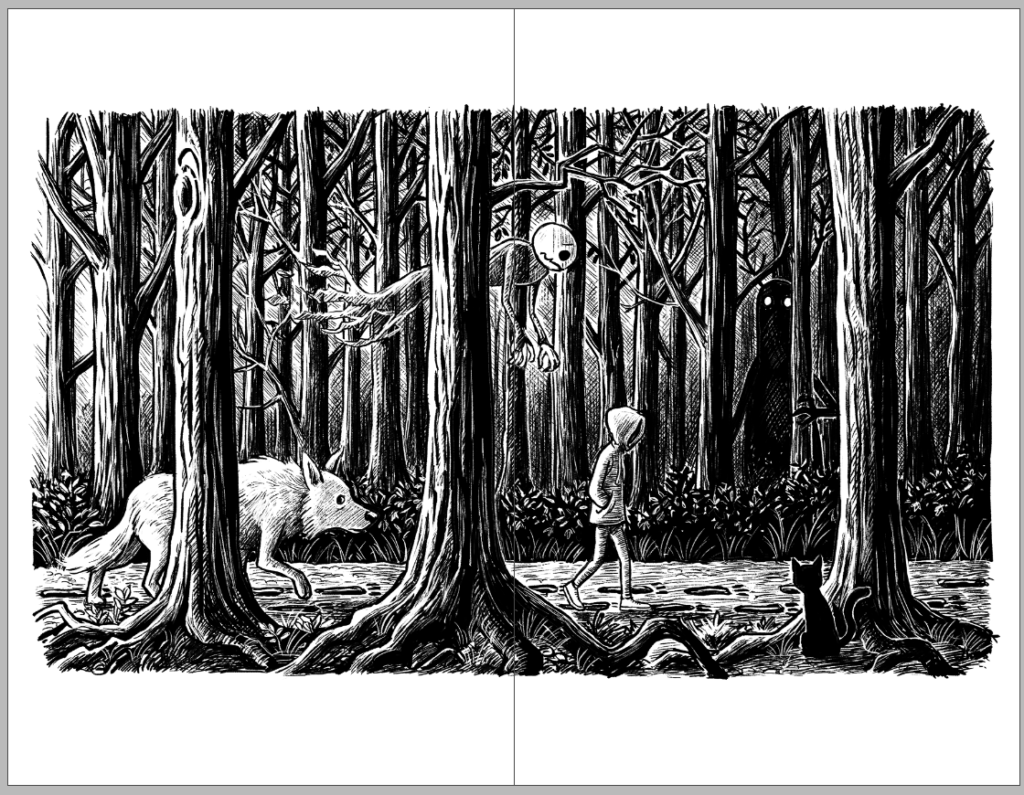
How was the writing process? How did you find working with the illustrator?
Erm, frantic! When I get an idea in my head, I don’t tend to stop until it’s all down on the page, which means like, not eating, not sleeping, glued to the keyboard until I physically can’t type anymore. This is definitely not an ideal way to write a book, let me tell you! But yeah, I basically got hit over the head with the idea, and then I was like “okay, it’s 5am, I really need to sleep, I’ll just write the first chapter in my Notes app so I remember to write the rest…” famous last words!
I’m so so grateful that this book got illustrations! I know my requests were so deeply weird – I wanted it to look like a haunted book, and that definitely comes across whilst still being whimsical, I think. Also my cat makes multiple cameos and I’m so grateful that she’s there, it honestly meant the world to see her there. I felt spoiled, honestly, and yeah, just intensely grateful that Conversations with Monsters looked the way I pictured it, and just – above and beyond, honestly.
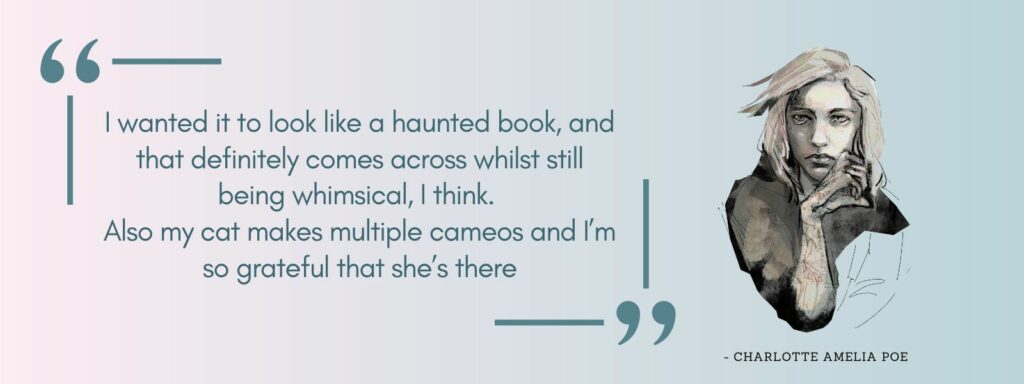
How do you write? Do you have a set routine or does it flow some days and not others?
Like I said about being hit over the head – that’s not an exaggeration, I’m not a very creative person – I’ve talked to people who have a dozen ideas at once, and I’ve never had that. Like, head empty, no thoughts, and then suddenly, BAM, here’s an idea that’ll eat my brain until I’ve got it all out! I do definitely see the value in having a routine, but I don’t like that people say “you’re not a writer unless you write every day”, that’s just not true. I think you need to find what works for you, and being neurodivergent, there have been so many hoops I’ve had to jump through just to be able to write, from using different programs, to writing thousands of words on my phone, to handwriting stuff, rinse and repeat, there’s no fixed way of doing this, and ultimately, you might cycle through so many different “tricks” to get your brain to cooperate, but as long as you have those words at the end of the day, even if you write fifty words a day, that’s fifty more words than you had before, right? But I think putting pressure on yourself to write is pretty deadly to the process – and I think in the case of something like this, where I thought it was way too weird to ever see the light of day – I think it was just a really fun experiment to see if I could write this, and maintain this use of language for an entire book. Whilst I think arbitrary goals are useful, like with NaNoWriMo, it does feel bad to not hit them, and some days you will wake up feeling ill, or have a migraine or whatever, and I think you’re not any less of a writer for skipping a day, and yeah, I wish I was one of those people who can reliably churn out three thousand words every single day, but I don’t think three thousand words of things HAPPEN to me every day, but I think you can definitely still nourish your abilities by reading something you wouldn’t have usually picked up, or listening to some poetry, or even watching a video essay or documentary about something you’ve never heard of before – I think expanding your horizons is the most useful thing you can do, so for me, when I am reading a book, I am sort of filing it away and mentally pulling quotes and ideas that fit with something I would like to work with. I think, with a lot of creative people, you’re never not working, in a sense, because everything you experience eventually feeds back into what you want to make.
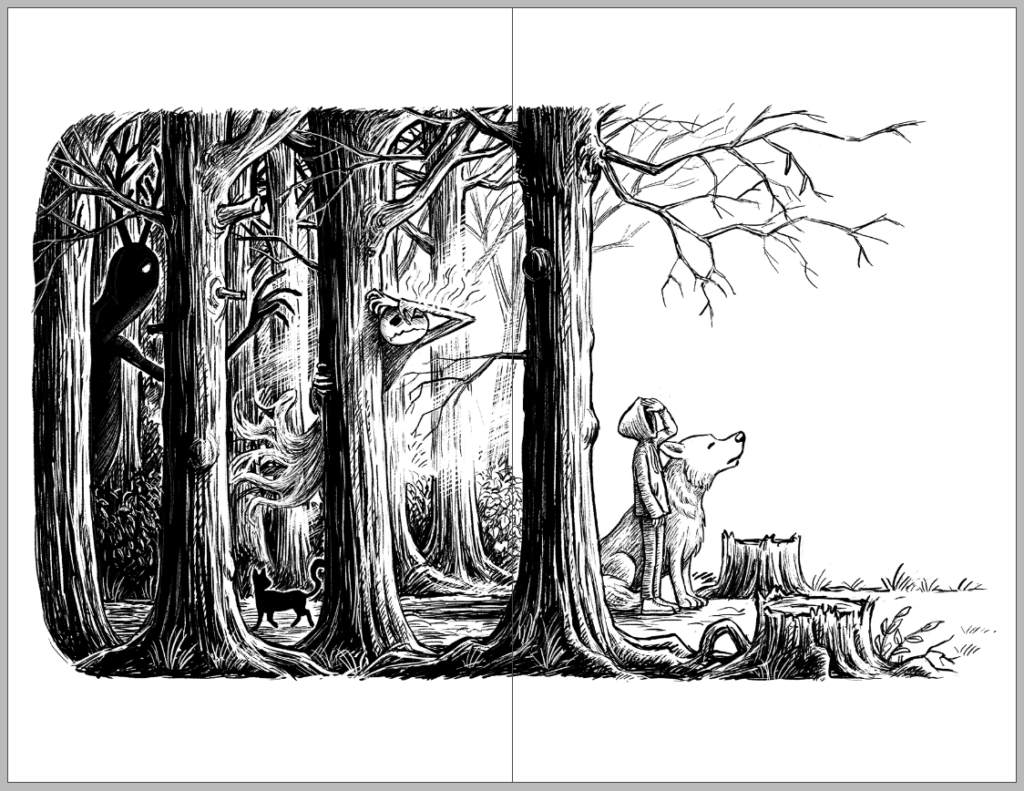
What about the editing process? Do you tend to have your ideas fully formed before you commit them to paper, or is there a huge difference between your first draft and finished book?
Definitely I need to have a really solid idea of what I want to write before I write anything, though that can change as I get further in, the idea of just writing something and not knowing roughly where I’ll end up is very scary! I’m SO bad at editing, I don’t want to kill my darlings, I like my darlings! Definitely all credit goes to the editors I worked with here, because 1) commas, how do they work? and 2) some of the stuff I wrote was not relevant to the subject, and so we did lose a couple of chapters along the way, and some chapters got rearranged. I love getting edits that are like “what does this sentence mean” because honestly, most of the time, I don’t know, I get in such a flow state when writing that sometimes my hands will get ahead of my brain and I have to go back and be like… huh, that’s not actually a sentence, that’s just some words. I really love all aspects of publishing, I’m such a little nerd for it, so finding out what you can and can’t quote, and what you can and can’t claim, it’s all really interesting, like there was a Springsteen quote in the first draft that is definitely not there now, just because it’s really expensive and time consuming to try quote Springsteen. But when I’m rich and famous? Damn right I’m finally having a chapter about The Boss.
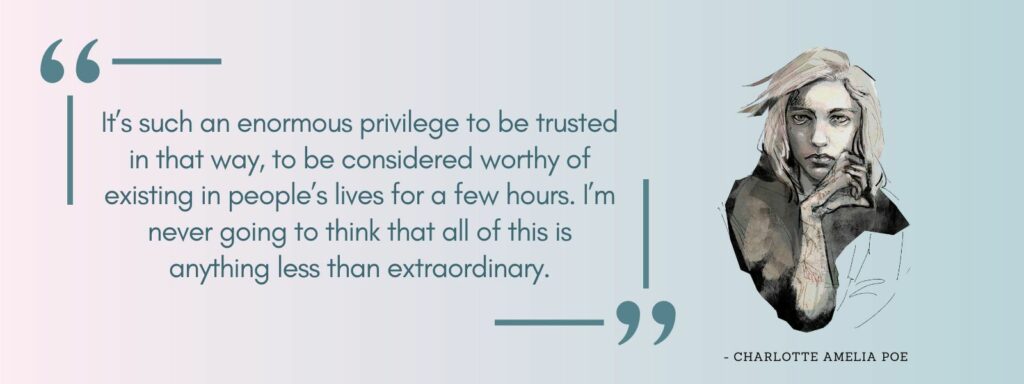
How are you feeling now that Conversations with Monsters will soon be out in the world?
It feels so totally surreal. Like, no matter how many books you publish, it never stops feeling like this insane privilege. I always feel like I’ve tricked everyone, and at the last minute they’re all going to realise! When I write, it really helps me, or motivates me, to imagine the cover, and also to imagine holding the book for the first time. Those two things are what get me over the finish line, every time. So when that actually happens? It absolutely blows my mind. It’s so strange, because my niblings have grown up never knowing any different, so they just see it as a thing I do, in the same way I grew up seeing my dad on stage and thought that was normal – I think it’s so funny that this family keeps producing introverts that nevertheless reach for the spotlight, and I never take for granted that I get to have that, that people are going to read my words, like??? It’s such an enormous privilege to be trusted in that way, to be considered worthy of existing in people’s lives for a few hours. I’m never going to think that all of this is anything less than extraordinary.
What can readers expect from the book?
Poetry – wait! Come back! Erm, sort of a real time processing of mortality and what that means as a creative person whose identity does rely on using creativity to find a voice, and reprocessing that as a neurodivergent person who has very firm beliefs about doing the most good that they can, and what that looks like. I refer to Conversations with Monsters as both “existential crisis book” and also “How To Be Autistic‘s older, weirder sibling”. I think I’ve grown up a lot since writing HTBA, and like I said earlier, this is much more deliberate than HTBA ever was and I do want to say that, like with HTBA, I don’t have any answers, but I feel like sometimes you don’t need answers, a lot of the time when it comes to empathy and feeling less alone, you do just want someone who understands how you feel, and hopefully this book can be that – I definitely could have used it and I think that’s how I write books, I write the books I wish I could have read, and that’s what I want to keep doing, because I think we internalise so, so much and I think books have this unique power to bridge gaps and to help you understand that you’re not the only person to have ever felt this way. Hey! You’re not alone!
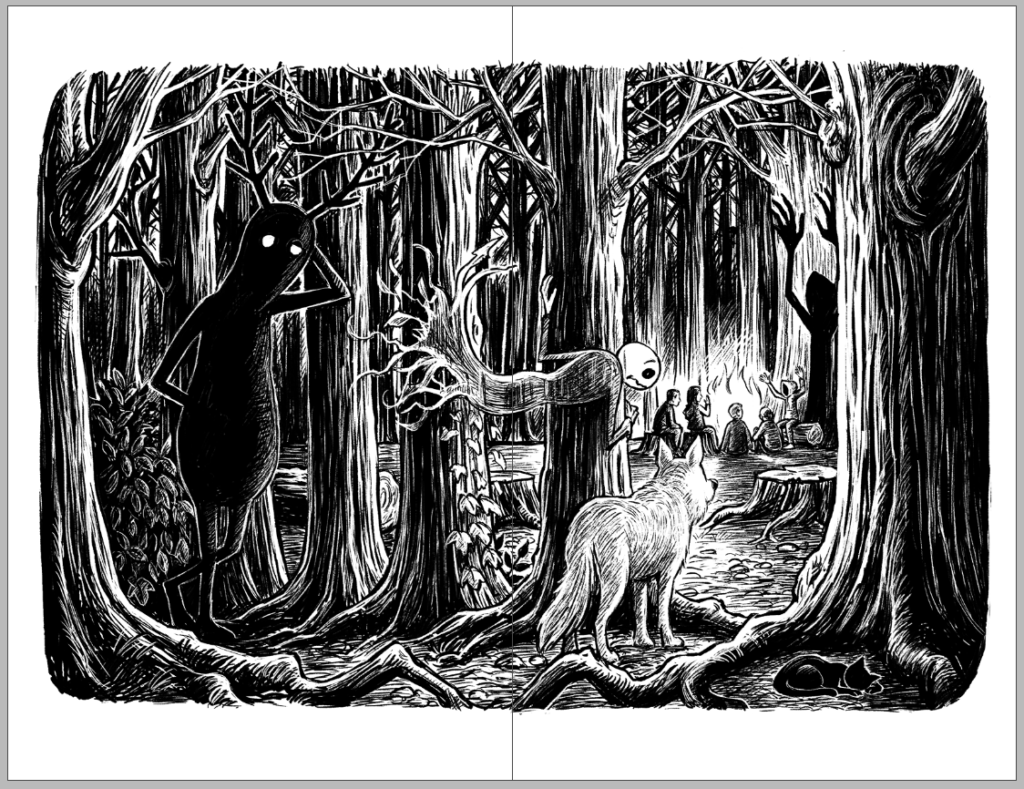
What’s next for you? Are you working on anything at the moment or just focusing on this book’s release right now?
I’m fiddling around with a draft of a book about agoraphobia right now – I had a pretty bad experience almost exactly a year ago that really knocked me off kilter, and I’m still recovering from that, so I’ve really been exploring that and my relationship to both the internet and fandom, and whether that’s been healthy for me. I keep thinking it’s done, but then I’ll add another chapter or rewrite a chapter, it’s definitely the most editing I’ve ever done for a book. The problem is I’m reading so much that relates to it right now that I want to create some grand thesis and ultimately, I do need to stop poking at it and just send it off, because there can always be more books further down the line that can elaborate on things further, but the perfectionist in me is like “no, we can solve everything in one book” and like… that’s unrealistic. So I definitely need some fresh eyes on it at this stage, I think there is definitely more to say, but at this point I feel like I’m talking over myself. But yeah, ideally I’d like to get that published, because I think agoraphobia is very misunderstood and having lived with it for most of my life and having had it return in such a terrifyingly real way, it’s very hard to be back where I was ten years ago, mentally, and to try pull myself out of that. Working towards the release of this book has been so helpful in reminding me that the world still exists and I’m so grateful to everyone at the publisher who emails me and gives me little updates – sometimes I think mental illness will make you forget that you’ve achieved anything, so those periodic reminders are so important and valuable, and I do want to throw myself into everything I can involving this book, because I think it might be what I need to get out of the door again!
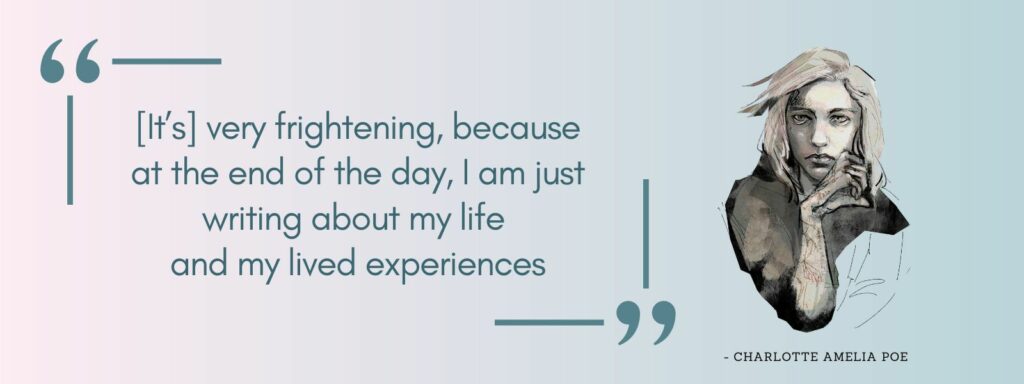
Is there anything else you want to add about the book or the experience in general?
I think in a lot of ways, it’s so much scarier than when HTBA came out, because nobody had any expectations of me then. It feels like there’s a lot of pressure to be good, or better, or the same but also new, and that’s very frightening, because at the end of the day, I am just writing about my life and my lived experiences, and I think with fiction you can distance yourself more from that, but with this, every word is something I’ve felt or thought, and so it feels like there’s so much more at stake as a result. So I do really hope people will like it, because it means so much to me, and I hope I get to keep doing this, because it really feels like it’s the thing I’m built to do, and I do just want to do the best I can by everyone who’s supported me along the way. It’s always such a risk for publishers every time they publish a book, so I feel so indebted to everyone who saw something in this book, and I do feel so grateful and I really hope readers will see that same spark and, essentially give me permission to keep doing this. I feel so, so lucky. I think sometimes life can be so full of bad, that you forget extraordinary things are possible. Anything that happens as a result of this book is such a gift, and I will never not be grateful for the trust of everyone involved, the reader, the publisher, everyone, has put in me in allowing me to do this. Who let the kid with face tattoos write multiple books, right? I feel very lucky.

Conversations with Monsters is available in paperback, ebook and audiobook from 21st June, and is available to pre-order now.